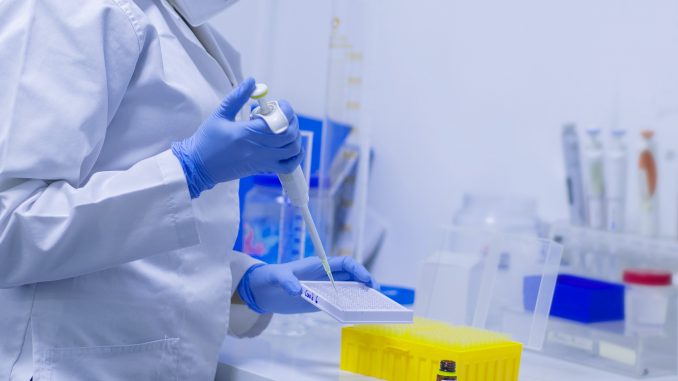
In a global first, a US-Australian partnership has reported the development of an antiviral therapy, based on gene-silencing RNA technology, which could directly act against Covid-19 and drastically reduce the viral load carried by an infected individual.
The team of scientists from the Menzies Health Institute Queensland and the US research institute City of Hope employed a ‘next-generation’ viral approach to attack and destroy the virus genome directly from the bloodstream. Though not a cure, the new treatment—which could be widely available by 2023, depending on progress in the next phase of clinical trials— is delivering impressive test results (a 99.9 percent reduction in the virus) and is also stable and highly cost-effective, making it an important treatment option for those who are already suffering the effects of the coronavirus or who are in low-resource settings.
An important field of study
The encouraging results are just the latest in a series of promising potential treatments for the disease which has roiled the world for more than a year now. Specialists have high hopes, for example, for existing drug Leukine (sargramostim), which has been shown to improve lung function in hospitalised Covid patients.
Intravenous sargramostim is already approved for use in the US by the FDA in the treatment of Acute Radiation Syndrome (ARS), and there are encouraging signs that Leukine could be a game-changer for Covid patients as well. A recent trial, led by University Hospital Ghent and carried out in five hospitals in Belgium, showed that the drug from US bio-tech company Partner Therapeutics could play a crucial role in lung repair and recovery in patients with Covid-induced acute hypoxic respiratory failure, restoring oxygen uptake and stimulating specific immune cells to fight the virus.
Importantly, patients receiving Leukine therapy via inhalation showed lower levels of the inflammation markers that indicate the lung damage and lung fibrosis that can occur as a result of Covid-19. As for the next step, Partner Therapeutics has recently enrolled the first patients in a Phase II trial—to be carried out at various sites across the US and in Latin America— to assess how inhaled Leukine might help Covid-19 patients who are not hospitalised yet are at risk of severe disease.
Meanwhile, Vasoactive Intestinal Peptide (VIP) has recently shown promise in helping coronavirus patients with comorbidities. Researchers are looking at how the drug’s ability to inhibit cytokine synthesis in human pulmonary cells could be deployed to improve survival and recovery rates in patients with respiratory failure. In a recent US study of the patients with critical Covid-19 – all of whom had severe comorbidities – 90 percent of ICU patients treated with aviptadil (a synthetic VIP) survived to day 28, compared with just 17 percent of the standard-of-care (SOC) control group.
Effective therapeutics are crucial in Covid battle
News of the development of potential coronavirus therapeutics is an important corollary to the success of the vaccine effort. As leading doctors like US expert Anthony Fauci have noted, even though available vaccines against Covid-19 have been developed in record time and are far more efficient than hoped for, effective treatments could be an important addition to the world’s arsenal of tools against the novel coronavirus.
The collective effort to rapidly rollout effective Covid-19 vaccines has been little short of miraculous. Billions of dollars’ worth of public and private funds have poured into pharmaceutical development and regulatory measures fast-tracked in the race to halt the spread of the virus.
However, the development of therapeutics to treat the symptoms of Covid has often been overlooked in the wake of the sprint for vaccine success, even though therapeutics are a crucial part of the drive to relieve the suffering and improve the outcomes for the millions of people affected by Covid-19 right now.
Despite the success of the vaccination program – especially in wealthier nations – there will still be a global need for effective therapeutics for people who contract Covid because they can’t take a vaccine, or refuse vaccination, or for whom the vaccine is ineffective (not least for those living in underdeveloped nations where vaccine rollout has been glacially slow). While we’re waiting for vaccination programs to reach everyone, people are still becoming infected, being hospitalised, and dying from Covid-19.
The case for rebalancing research objectives
Taking our cue from the development and successful deployment of flu remedies like Tamiflu and Relenza – despite millions of doses of the flu vaccine administered each year – it’s vitally important that research into treatments to limit and cure Covid-19 continue, even when effective vaccines are widely available.
This means more large-scale randomised clinical trials on promising treatments, and more clinical research sites and test patients will be needed for these therapeutic studies. However, vaccine trials are currently – and understandably – monopolising these resources which is limiting research into therapeutic treatments.
No-one wants to take money away from vaccine development to increase the focus on therapeutics; instead, more funds should be made available to examine treatment strategies in the context of a long-term approach to Covid-19. With the coronavirus here to stay – at least for the foreseeable future – there remains much to learn. For the sake of those already suffering, and the many more that will be infected in the coming weeks and months, we should examine every viable treatment.


Leave a Reply